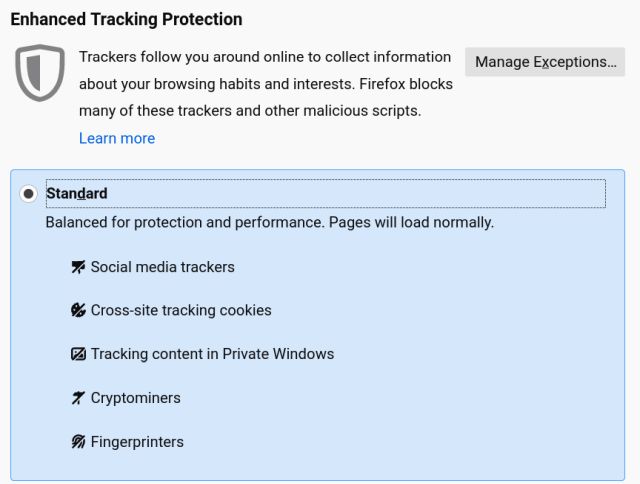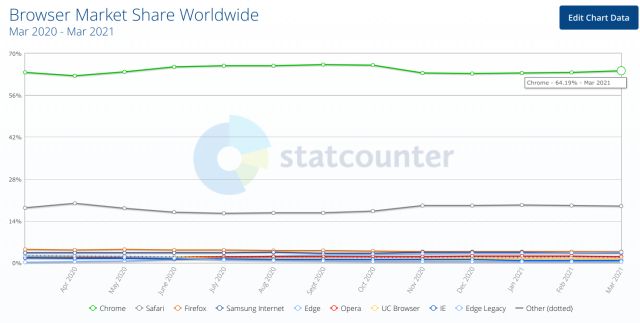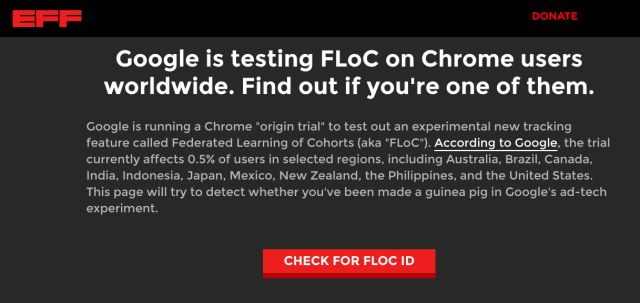What is Google's FLoC and Why You Should Block It - armstrongwharand1944
In January 2022, Google announced its plans to start testing its new-sprung interest-founded advertising standard called Federated Learning of Cohorts (FLoC). It's organism said that FLoC will at long las replace the third-party cookies that most websites on the internet presently use. But is it just that, OR is there more to Floccule? In this article, we last over what is Google's FLoC and why the company is underdeveloped this new technology. Apart from that, we too discuss the cons of FLoC and how you can buoy block FLoC on Chrome in just a few steps. So without wasting whatsoever time, countenance's jump right in.
Google FLoC Explained (2021)
Hera, we have explained everything about Google's FLoC in lucid terms. You can click happening the table below and move to the same section with ease.
What is Google's Floccule?
Floccule operating room Federated Scholarship of Cohorts is a new web standard developed by Google, and it aims to protect drug user privacy away replacing third-party cookies. In 2022, Google announced that information technology's building a many private net, and FLoC is a result of that effort. Approach to how it works, well, supported your live week's browse history, Chrome learns active your interests and behavior across the web. Then, exploitation this information, Google will put up you in a "cohort" Beaver State a grouping of individuals having similar interests.
Google claims that the cohort wish accept many than a thousand users, so a website won't be able to name users individually. All week, Chrome will return a new FLoC Idaho based along your past browsing history and dog you with a synonymous cohort. Mind, this whole computation of FLoC ID happens locally on your device and stored only on your device. On the face of it, Floccule seems like a decently concept. But there is more to that, so scan on to find the issues with Google's Floccule and why Google decided to body-build an alternative to third-party cookies.
Why is Google Replacement Third base-party Cookies with FLoC?
Before anything, we must understand why Google stepped in and actively took tear to make over an alternative to third-political party cookies. Over the past some years, there has been a change in the narrative more or less exploiter privacy connected the entanglement. And well, the tide is turning against Google. The central point in this discourse has been third-party cookies and how they enable websites to show deeply personalized and dead on target ads. In 2022, Apple announced that Hunting expedition is going to block all third-party cookies by default. Firefox has been blocking third-party cookies by default since 2022.

Today, the emergence of concealment-focused browsers like DuckDuckGo, Brave, and Tor is a tell-tale sign of the new direction users are taking to protect their privacy. Non to forget, even the new Atomic number 24 Edge has also started blocking close to third-party cookies by default. It's clear the war is on one-third-party cookies, and other browser vendors are in no temper to allow these cross-website trackers.
In all of this, Chrome stands out in a contrasting manner. Chrome leads the browser marketplace with o'er 64% share and does non block ordinal-party cookies by default. To bug out of this unique position, in 2022, Google decided to clear the air by locution that it will phase out third-party cookies altogether to protect user privacy. That came as a appall at the time as ads are the largest gross seed for Google. But, who knew that the company was busy building a replacement called FLoC to guard user privacy instead of completely blocking third-party cookies.

Think of, Google is the market drawing card in online ads and has the largest ad network on the web. The company gets most of its tax income from ad business, so it was incumbent on Google to provide an secondary. And seeing other browsers putt an unrelenting fight to make third-political party cookies irrelevant, Google had to do something to hold open its business. In summation, the need to bring an alternative to thirdly-party cookies does not seem to protect user privateness. Instead, Floccule is an try out by Google to salvage its online anno Domini business amid a raging privateness war.
What Are the Issues with FLoC?
-
Choice of Ad Tracking System
The fundamental issue with Floccule is that users have to choose 'tween "overage tracking" and "young tracking", as per Bennett Cyphers of EFF. If you are serious roughly protecting privacy, then it should non come at the cost of choosing betwixt an old and a new arrangement. Instead, your centre should primarily personify on abolishing the whole surveillance tech. Critics have repeatedly same that allowing third-party cookies was the web's biggest mistake. And now, letting it run under a different set of protocols is as harmful as the former standard.

-
Fingerprinting
If you are unaware, third-party cookies enable fingerprinting that allows websites to track person users crosswise the vane. Websites can find your identity on the cyberspace in milliseconds, just by seeing how your browser reacts to a book. That's why we recommend disabling third-party cookies on Chrome. There are several such data points that can help websites speck your accurate identity. That's one of the key reasons why Facebook, YouTube, and past websites have become so good at targeted advertising.
Google's reasoning is that IT wants to stop fingerprinting with Floccule. Simply the critics warn that the FLoC ID can get along peerless of the data points that third-party cookies employ to describe users. In fact, they veneration that the FLoC ID power aid and beef up an already-powerful exploiter trailing system on the internet.

Encourage, Google has besides announced Privacy Sandbox, which will be incorporated into Chrome to protect your FLoC ID. But on therewith, it as wel comes with much of services that were earlier used on third-party cookies. For example, Pigin, Sparrow, Pelican, Parrot, etc., are some of the birdie-themed standards that have the functions designed to satisfy the advertiser's needs.
Entirely in complete, IT seems the FLoC tech is designed especially for advertisers, and protective drug user privacy is just an afterthought. Google itself acknowledges that protecting FLoC ID from fingerprinting is a fractious challenge, and it will seem into the issue in the future.
When is FLoC Rolling Outer to Users?
From March 2022, Google started running an "Origin" trial with Floccule, and the test is currently underway for Chrome users around the planetary. The chosen regions are Australia, Brazil, Canada, Republic of India, Indonesia, Japan, Mexico, Young Sjaelland, the Philippines, and the Conjugated States. The test is limited to only 0.5% of the exploiter base and is questionable to end in April. And so, this tracking technology will make its way to Canary, Developer, and Beta builds. It will finally reach the Google Chrome stable build in the coming months.
Check If Google Is Tracking You With FLoC

If you neediness to check if you are part of the FLoC trial, head to this website and click the 'See to it for Floccule ID' push to find out. The Jazz has developed this website to make users aware of whether they are part of Google's new tracking tech test group. Right forthwith, if you are part of the Floccule trial, you can't opt out, and that's a bummer. Yet, the company plans to offer a toggle switch to turn along/turned Floccule on Chrome in the coming months.
Interim, other privacy-centralized browsers look-alike DuckDuckGo, Vivaldi, and Braw have announced that they will closure Google's FLoC tracking organization on their Chromium builds. Firefox and Safari are non affected by FLoC as they are not built on Atomic number 24. So, Apple users who surf the internet via Safari are safe from Google's unweathered trailing system.
Microsoft hasn't officially confirmed whether IT will implement FLoC or not in its new Chromium-supported Edge browser. Only, as per its recent statement, the Redmond large recommended that it might not follow up Google's new-sprung tracking system for the sake of user privacy.

The world's largest CMS service supplier, WordPress, has announced that it will also automatically occlude Google's Floccule on websites. The upcoming WordPress adaptation 5.8 update testament include an extra four-line code to disable Google's FLoC on websites. That will mechanically disable the Floccule system for new WordPress installations. But, admins force out override the code to enable it and take part in Google's test if they choose to.
How to Block FLoC on Google Chromium-plate?
DuckDuckGo is not wasting any time and has already successful changes to its Privacy Essentials extension to block FLoC on Chrome. Click here and install the Chrome file name extension on your browser and, FLoC bequeath be disabled. Note that the extension must get on version 2022.4.8 or higher up to have the recent changes.

Everything You Involve to Have a go at it Astir Federated Learning of Cohorts by Google
Sol this is what FLoC is all about and what it means for the web in the coming future. While Google portrays its new tracking applied science as a privacy-friendly move, we should dig deeper and memorise about its serious implications in the future. Indeed, third-party cookies are the pessimum and need a replacement but Floccule, although slightly better, seems to personify a substitute the vicious counselling. Anyway, that is all from us. If you neediness to learn more ways to enhance Google Chrome security, so head over to our detailed guide. And if you have any questions, annotate down below and let us have it away.
Source: https://beebom.com/what-is-google-floc/
Posted by: armstrongwharand1944.blogspot.com


0 Response to "What is Google's FLoC and Why You Should Block It - armstrongwharand1944"
Post a Comment